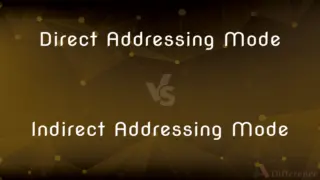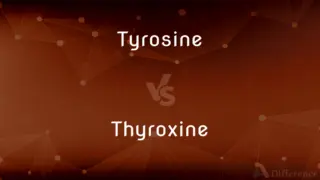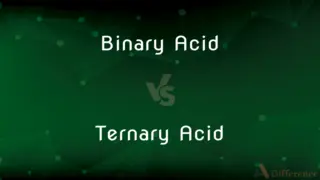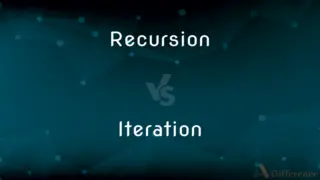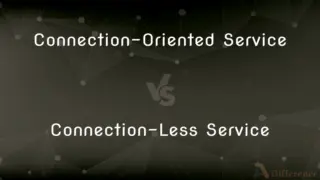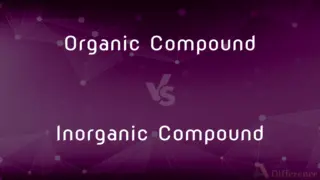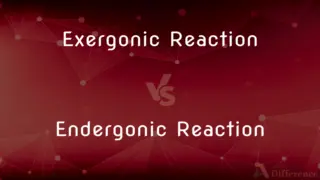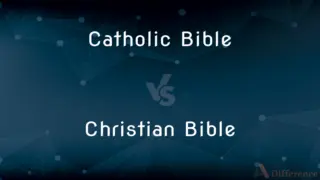Seed vs. Leecher — What's the Difference?
By Tayyaba Rehman — Updated on September 22, 2023
Seed refers to a user who has a complete copy of a file in a peer-to-peer network and is sharing it. Leecher is a user who downloads the file but does not share it back, thereby consuming bandwidth without contributing.

Difference Between Seed and Leecher
Table of Contents
ADVERTISEMENT
Key Differences
Seed and Leecher are terms primarily used in peer-to-peer (P2P) file-sharing networks. A Seed is an individual who has downloaded a complete file and is sharing it with others. A Leecher, by contrast, is someone who is downloading the file but not sharing it back.
The role of a Seed in a P2P network is crucial for the health of that network. Seeds help in distributing files more efficiently by allowing other users to download pieces from them. Leechers, on the other hand, consume resources by downloading but not uploading, thus weakening the overall efficiency of the network.
Seeds are typically encouraged in P2P communities. The more Seeds there are, the faster the download speed for everyone else in the network. Leechers, on the other hand, are usually frowned upon because they take from the community without giving back.
Seeds often stop being Seeds once they decide to stop sharing the file. Leechers can become Seeds if they complete the download and continue to share the file. Both terms describe the dynamic roles that users play in a P2P network.
Comparison Chart
Role
Provider of file pieces
Consumer of file pieces
ADVERTISEMENT
Contribution
Uploads and downloads
Only downloads
Network Impact
Positive
Negative
Community View
Encouraged
Generally frowned upon
Evolution
Can stop being a Seed
Can become a Seed
Compare with Definitions
Seed
Seed is a user in a P2P network who has a complete file and shares it.
John acted as a Seed for the new software update.
Leecher
Leecher refers to someone who takes advantage without giving back.
He was considered a Leecher in the online community.
Seed
Seed is a term used in gardening to signify the beginning stage of a plant.
I planted a sunflower Seed in my garden.
Leecher
Leecher is a derogatory term for a freeloader.
Nobody likes a Leecher who takes but never gives.
Seed
Seed is used in sports to signify a player's or team's rank.
Serena Williams was the top Seed in the tournament.
Leecher
Leecher is a user in a P2P network who downloads without sharing.
Sarah was a Leecher and downloaded the movie without seeding.
Seed
A seed is an embryonic plant enclosed in a protective outer covering. The formation of the seed is part of the process of reproduction in seed plants, the spermatophytes, including the gymnosperm and angiosperm plants.
Leecher
Leecher denotes a non-contributor in a community or network.
As a Leecher, her reputation in the network was poor.
Seed
A mature plant ovule containing an embryo.
Leecher
Leecher is sometimes used in gaming to describe players who don't contribute.
He was kicked out of the team for being a Leecher.
Seed
A small dry fruit, spore, or other propagative plant part.
Leecher
One who leeches; a physician.
Seed
Seeds considered as a group
A farmer buying seed.
Leecher
One who downloads a torrent.
Seed
The seed-bearing stage of a plant
The grass is in seed.
Seed
A larval shellfish or a hatchling fish
Released scallop seed in the bay.
Seed
An egg or cocoon of certain insects
Silkworm seed.
Seed
A tiny bubble in a piece of glass.
Seed
(Medicine) A form of a radioactive isotope that is used to localize and concentrate the amount of radiation administered to a body site, such as a tumor.
Seed
A source or beginning; a germ
The seed of an idea.
Seed
A small amount of material used to start a chemical reaction.
Seed
A small crystal used to start a crystallization process.
Seed
A cell that disperses, especially a cancer cell that spreads from a primary tumor to another location in the body.
Seed
Offspring; progeny.
Seed
Family stock; ancestry.
Seed
Sperm; semen.
Seed
(Sports) A player who has been seeded for a tournament, often at a given rank
A top seed.
Seed
To plant seeds in (land, for example); sow.
Seed
To plant (a crop, for example) as seeds in soil.
Seed
To remove the seeds from (fruit).
Seed
To furnish with something that grows or stimulates growth or development
A bioreactor seeded with bacteria.
Seed
To disperse to, as cancer cells
Organs seeded by circulating tumor cells.
Seed
To disperse or transfer (cancer cells, for example)
A needle biopsy that seeded cancer cells into adjacent tissue.
Seed stem cells onto collagen gels.
Seed
(Meteorology) To sprinkle (a cloud) with particles, as of silver iodide, in order to disperse it or to produce precipitation.
Seed
To arrange (the drawing for positions in a tournament) so that the more skilled contestants meet in the later rounds.
Seed
To rank (a contestant) in this way.
Seed
To help (a business, for example) in its early development.
Seed
To sow seed.
Seed
To pass into the seed-bearing stage.
Seed
(Medicine) To disperse and often multiply, as cancer cells.
Seed
Set aside for planting a new crop
Seed corn.
Seed potatoes.
Seed
Intended to help in early stages
Provided seed capital for a fledgling business.
Seed
A fertilized and ripened ovule, containing an embryonic plant.
Seed
(countable) Any small seed-like fruit.
If you plant a seed in the spring, you may have a pleasant surprise in the autumn.
Seed
Any propagative portion of a plant which may be sown, such as true seeds, seed-like fruits, tubers, or bulbs.
Seed
An amount of seeds that cannot be readily counted.
The entire field was covered with geese eating the freshly sown seed.
Seed
(countable) A fragment of coral.
Seed
(uncountable) Semen.
A man must use his seed to start and raise a family.
Seed
A precursor.
The seed of an idea
Which idea was the seed (idea)?
Seed
(countable) The initial state, condition or position of a changing, growing or developing process; the ultimate precursor in a defined chain of precursors.
Seed
(sports) The initial position of a competitor or team in a tournament. (seed position)
The team with the best regular season record receives the top seed in the conference tournament.
Seed
The competitor or team occupying a given seed. (seed position)
The rookie was a surprising top seed.
Seed
(cryptography) The initialization state of a pseudorandom number generator or similar system. (seed number)
If you use the same seed you will get exactly the same pattern of numbers.
Seed
Commercial message in a creative format placed on relevant sites on the Internet. (seed idea or seed message)
The latest seed has attracted a lot of users in our online community.
Seed
Offspring, descendants, progeny.
The seed of Abraham
Seed
Race; generation; birth.
Seed
A small bubble formed in imperfectly fused glass.
Seed
(transitive) To plant or sow an area with seeds.
I seeded my lawn with bluegrass.
Seed
(transitive) To cover thinly with something scattered; to ornament with seedlike decorations.
Seed
(transitive) To start; to provide, assign or determine the initial resources for, position of, state of.
A venture capitalist seeds young companies.
The tournament coordinator will seed the starting lineup with the best competitors from the qualifying round.
The programmer seeded fresh, uncorrupted data into the database before running unit tests.
Seed
To allocate a seeding to a competitor.
Seed
To leave (files) available for others to download through peer-to-peer file sharing protocols (e.g. BitTorrent).
Seed
(intransitive) To be qualified to compete, especially in a quarter-final, semi-final, or final.
The tennis player seeded into the quarters.
Seed
(intransitive) To produce seed.
Seed
(intransitive) To grow to maturity.
Seed
To ejaculate inside the penetratee during intercourse, especially in the rectum.
Seed
(dialectal) see
Seed
A ripened ovule, consisting of an embryo with one or more integuments, or coverings; as, an apple seed; a currant seed. By germination it produces a new plant.
And God said, Let the earth bring forth grass, the herb yielding seed, and the fruit tree yielding fruit after his kind, whose seed is in itself.
Seed
The generative fluid of the male; semen; sperm; - not used in the plural.
Seed
That from which anything springs; first principle; original; source; as, the seeds of virtue or vice.
Seed
The principle of production.
Praise of great acts he scatters as a seed,Which may the like in coming ages breed.
Seed
Progeny; offspring; children; descendants; as, the seed of Abraham; the seed of David.
Seed
Race; generation; birth.
Of mortal seed they were not held.
Seed
To sow seed.
Seed
To shed the seed.
Seed
To grow to maturity, and to produce seed.
Many interests have grown up, and seeded, and twisted their roots in the crevices of many wrongs.
Seed
To sprinkle with seed; to plant seeds in; to sow; as, to seed a field.
Seed
To cover thinly with something scattered; to ornament with seedlike decorations.
A sable mantle seeded with waking eyes.
Seed
A small hard fruit
Seed
A mature fertilized plant ovule consisting of an embryo and its food source and having a protective coat or testa
Seed
One of the outstanding players in a tournament
Seed
Anything that provides inspiration for later work
Seed
The thick white fluid containing spermatozoa that is ejaculated by the male genital tract
Seed
Go to seed; shed seeds;
The dandelions went to seed
Seed
Help (an enterprise) in its early stages of development by providing seed money
Seed
Bear seeds
Seed
Place (seeds) in or on the ground for future growth;
She sowed sunflower seeds
Seed
Distribute (players or teams) so that outstanding teams or players will not meet in the early rounds
Seed
Sprinkle with silver iodide particles to disperse and cause rain;
Seed clouds
Seed
Inoculate with microorganisms
Seed
Remove the seeds from;
Seed grapes
Seed
Seed refers to the original source of a digital file.
The Seed for the video had excellent quality.
Seed
Seed can refer to the origin or starting point of something.
The Seed of the idea came from our brainstorming session.
Common Curiosities
Why are Seeds important?
Seeds are important for the efficiency and health of a P2P network.
How does being a Seed affect download speeds?
Being a Seed generally increases download speeds for others in the network.
Are Leechers bad for a P2P network?
Yes, Leechers are generally considered bad because they consume without contributing.
What is a Seed?
A Seed is a user who has a complete file and shares it in a P2P network.
Why are Leechers frowned upon?
Leechers are frowned upon because they take from the network without giving back.
Is it illegal to be a Seed or a Leecher?
The legality depends on the content being shared; sharing copyrighted material without permission is illegal.
What is a Leecher?
A Leecher is a user who downloads files but does not share them back in a P2P network.
How can I stop being a Leecher?
To stop being a Leecher, complete your download and share the file.
Can a Seed also download from other Seeds?
Generally, a Seed does not need to download as they already have the complete file.
Can a Leecher become a Seed?
Yes, a Leecher can become a Seed by completing the download and sharing the file.
What does it mean to 'Seed a torrent'?
To 'Seed a torrent' means to upload pieces of the file for others to download.
What is 'Leeching a torrent'?
'Leeching a torrent' means downloading the file without sharing it.
Can a Leecher download from another Leecher?
A Leecher usually downloads from Seeds, but may download pieces from other Leechers who have them.
How do I become a Seed?
To become a Seed, download a complete file and share it through your P2P client.
Is it better to have more Seeds or fewer Leechers?
It's generally better to have more Seeds as they contribute to faster downloads and a healthier network.
Share Your Discovery

Previous Comparison
Slovakia vs. Slovenia
Next Comparison
Linux vs. UbuntuAuthor Spotlight
Written by
Tayyaba RehmanTayyaba Rehman is a distinguished writer, currently serving as a primary contributor to askdifference.com. As a researcher in semantics and etymology, Tayyaba's passion for the complexity of languages and their distinctions has found a perfect home on the platform. Tayyaba delves into the intricacies of language, distinguishing between commonly confused words and phrases, thereby providing clarity for readers worldwide.















